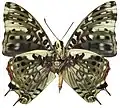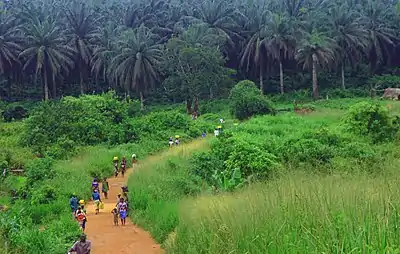Charaxes etesipe
Charaxes etesipe, the savannah charaxes or scarce forest emperor, is a butterfly of the family Nymphalidae.
| Charaxes etesipe | |
|---|---|
 | |
| C. e. etesipe from Cameroon - dorsal view | |
 | |
| C. e. etesipe from Cameroon - ventral view | |
| Scientific classification | |
| Domain: | Eukaryota |
| Kingdom: | Animalia |
| Phylum: | Arthropoda |
| Class: | Insecta |
| Order: | Lepidoptera |
| Family: | Nymphalidae |
| Genus: | Charaxes |
| Species: | C. etesipe |
| Binomial name | |
| Charaxes etesipe | |
| Synonyms | |
| |
Description
The wingspan is 35–38 millimetres (1.4–1.5 in) for male. The females are larger, reaching 37–45 millimetres (1.5–1.8 in).
The uppersides of the forewings are blackish blue with a greenish tint. The outer margin are generally denticulate (tooth like), with a series of white discal spots. In the hindwings of both sexes there are short tails and a complete series of large pale blue patches. The undersides of the wings are variegated with cream and drab colours. A full description is given by Rothschild, W. And Jordan, K., 1900 Novitates Zoologicae Volume 7:455-457 page 428-429 (for terms see Novitates Zoologicae Volume 5:545-601 ) Seitz-The transverse band on the upperside of the hindwing in the male is blue and placed beyond the middle of the wing, in the female it is at least partly white and placed about at the middle. — etesipe Godt. male The transverse band of the forewing is narrow, entirely broken up into spots, only those in cellules la, lb and 2 are blue, the others white, and placed near the distal margin; white spots are also present in the basal part of cellules 2—6 and at the apex of the cell; the median band on the upperside of the hindwing is only 2–3 mm. in breadth and is also broken up into spots. Female- The transverse band on the upper surface is broad and white, the markings at the distal margin of the hindwing indistinct. Sierra Leone to Angola and Unyoro. — abyssinicus Rothsch. differs from the type-form in having the blue transverse band of the hindwing in the male continuous and about 5 mm. in breadth; the blue spot in cellules la and lb on the upperside of the forewing are also larger than in etesipe ; the female is unknown. Abyssinia. — tavetensis Rothsch. Male : he blue transverse band on the upperside of the hindwing is posteriorly continuous and very broad (7—8mm. in breadth in cellule 2), but anteriorly much narrowed and broken up into spots; the blue spots in cellules la and 1 b of the forewing are larger than in etesipe, but smaller than in abyssinicus. The female is very similar to that of typical etesipe, but somewhat smaller and with more distinct markings at the distal margin of the hindwing above. East Africa from Nyassaland to Taveta in British East Africa.[3]
Biology
Adults are on wing from August to October and from March to June. There are two generations per year.[4]
The larvae of subspecies tavetensis feed on Afzelia quanzensis, Dalbergia nitidula, Securidaca longipeduncularis and Margaritaria discoidea. Other subspecies have been recorded on Entada and Afzelia quanzensis.

Notes on the biology of etesipe are given by Kielland, J. (1990) and Larsen, T.B. (2005) [5][6]
Distribution
This species can be found in tropical east and west Africa and in Madagascar in a mosaic of habitats but mainly in Afrotropical forest.
Taxonomy
Kielland regards to be closely related to Charaxes penricei and Charaxes cacuthis and considers tavetensis as a species distinct from etesipe and regards pemba and shaba as subspecies of tavetensis . Charaxes etesipe is a member of the species group Charaxes etesipe
The clade members are:
- Charaxes etesipe nominate
- Charaxes penricei
- Charaxes achaemenes
- Charaxes paradoxa
- Charaxes cacuthis
- Charaxes bwete
- Charaxes cristalensis
Subspecies
- C. e. etesipe (Sierra Leone, Ivory Coast, Liberia, Benin, Togo, Ghana, Nigeria, southern Chad, Cameroon, southern Sudan, northern Angola, Uganda, northern Kenya)
- C. e. abyssinicus Rothschild & Jordan, 1900 [7] (Ethiopia (west of Rift)
- C. e. gordoni van Someren, 1935 [8] (Kenya (north-eastern side of Mount Kenya))
- C. e. hercules Turlin & Lequeux, 2002 [9] (Uganda)
- C. e. patrizii Storace, 1949 [10](Somalia)
- C. e. pemba van Someren, 1966 .[11] (Pemba Island)
- C. e. shaba Berger, 1981 [12] (Zaire (Shaba))
- C. e. tavetensis Rothschild, 1894[13] (Malawi, Mozambique, coast of Kenya, Tanzania, South Africa) perhaps a species
Subspecies gallery
 C. e. abyssinicus from Ethiopia
C. e. abyssinicus from Ethiopia C. e. etesipe from Cameroon - dorsal view
C. e. etesipe from Cameroon - dorsal view C. e. etesipe from Cameroon - ventral view
C. e. etesipe from Cameroon - ventral view
References
- Godart, J.B. in Latreille , P.A., & Godart, J.B. [1819], [1824]. Encyclopedie Methodique Histoire Naturelle [Zoologie] 9 Entomologie: i-iv, 1-328 [1819], 329-828 [1824]. Paris.
- Savela, Markku (March 23, 2019). "Charaxes etesipe (Godart, [1824])". Lepidoptera and Some Other Life Forms. Retrieved February 4, 2020.
- Aurivillius, [P.O.]C. 1908-1924. In: Seitz, A. Die Großschmetterlinge der Erde Band 13: Abt. 2, Die exotischen Großschmetterlinge, Die afrikanischen Tagfalter, 1925, 613 Seiten, 80 Tafeln (The Macrolepidoptera of the World 13).Alfred Kernen Verlag, Stuttgart.
 This article incorporates text from this source, which is in the public domain.
This article incorporates text from this source, which is in the public domain. - Woodhall, Steve (2005). Field Guide to Butterflies of South Africa. Cape Town, South Africa: Struik. ISBN 978-1-86872-724-7.
- Kielland, J. 1990. Butterflies of Tanzania. Hill House, Melbourne and London: 1-363.
- Larsen, T.B. 2005 Butterflies of West Africa. Apollo Books, Svendborg, Denmark: 1-595 (text) & 1-270 (plates).
- Rothschild, W., & Jordan, K. 1900. A monograph of Charaxes and the allied prionopterous genera. Novitates Zoologicae 7: [i-iv], 287-524.
- van Someren, V.G.L. 1936. Butterflies of Kenya and Uganda. Supplement to Vol. I. Journal of the East Africa and Uganda Natural History Society 12: 147-199.
- Turlin, B., & Lequeux, J.P. 2002. Notes sur les Charaxinae d’Uganda et description de deux nouvelles sous-especes (Lepidoptera Nymphalidae). Lambillionea 102 (1) (Tome I): 69-76.
- Storace, L. 1949. Lepidotteri diurni. Annali del Museo Civico di Storia Naturale (di Genova) Giacomo Doria 64: 12-29.
- Van Someren, V.G.L. 1966. Revisional notes on African Charaxes (Lepidoptera: Nymphalidae). Part III. Bulletin of the British Museum (Natural History) (Entomology) 18: 45-101.
- Berger, L.A. 1981. Les papillons du Zaire. Weissenbruch, Bruxelles: 1-543.
- Rothschild, W. 1894. Some new species of Lepidoptera. Novitates Zoologicae 1: 535-540.
- Victor Gurney Logan Van Someren (1966). Revisional notes on African Charaxes (Lepidoptera: Nymphalidae). Part III. Bulletin of the British Museum (Natural History) (Entomology) 45–101.
External links
- Pteron World
- "Charaxes etesipe (Godart, 1824)". Insecta.pro.
- Charaxes etesipe images subspecies and forma at Consortium for the Barcode of Life.
- Charaxes tavetensis images at BOLD
- Charaxes tavetensis tavetensis images at BOLD (verso)
- Charaxes tavetensis pemba images at BOLD
- Images of C. etesipe etesipe Royal Museum for Central Africa (Albertine Rift Project)
- Images of C. etesipe gordoni (Albertine Rift Project)
- Images of C. etesipe shaba (Albertine Rift Project)
- Images of C. etesipe tavetensis (Albertine Rift Project)